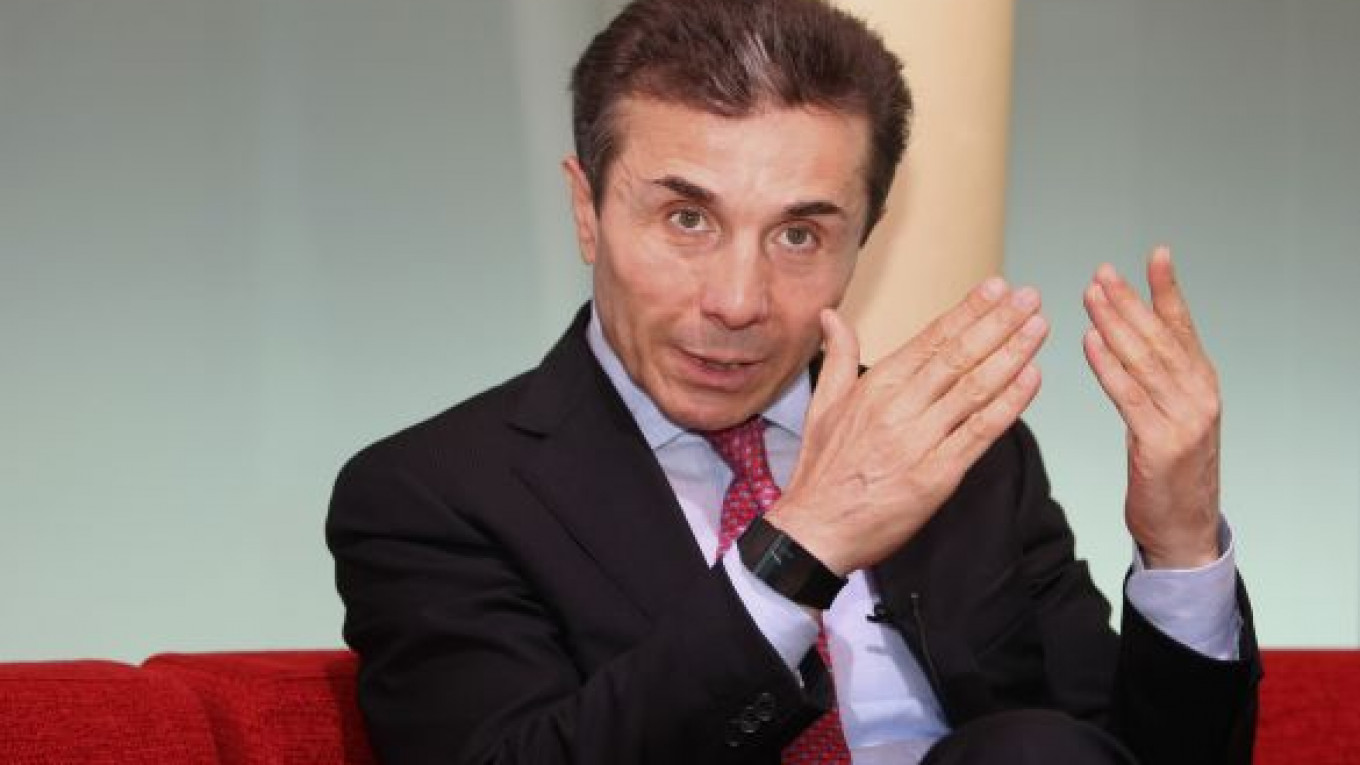Georgia's richest man, billionaire and philanthropist Bidzina Ivanishvili, seems to have it all: a head-spinning fortune, the respect of his country and gleaming, art-filled palaces across the globe, including one where zebras and pink flamingos roam.
What else could he want?
Political power, it turns out, and that has put him on a collision course with President Mikheil Saakashvili, his onetime friend and ally.
Since announcing his ambitions a year ago, Ivanishvili has been stripped of his Georgian citizenship and hit with fines of tens of millions of dollars. But he is undeterred in leading his Georgian Dream party into next week's parliamentary elections, which he hopes will make him prime minister, set to become the country's most powerful job after legislative changes next year.
The 56-year-old Ivanishvili, worth an estimated $6.4 billion, was an early supporter of Saakashvili after he came to power following the 2003 Rose Revolution demonstrations that drove out the corruption-riddled regime of Eduard Shevardnadze. But Ivanishvili, who made his fortune in Russia, gradually became disenchanted and began to fear that his disagreements with Saakashvili could imperil his future.
In an interview with The Associated Press, he suggested that his entry into politics was at least partly to shield him from government pressure.
"When you enter politics, it gives you some kind of protection," he said. But he insisted that his rags-to-riches story also points to a deeper drive to help his country: "A smart, gifted person can do things for himself, but also for his friends, for his village, for his country."
Ivanishvili was the youngest of five children in a hilltop village so poor and remote that a rickety old truck brought supplies just once a month. He often had no shoes and dreamed of owning a bicycle. After earning an engineering degree in the capital, Tbilisi, he moved to Moscow, where he received a doctorate in labor economy.
When Soviet leader Mikhail Gorbachev launched his perestroika campaign and gradually allowed private entrepreneurship, Ivanishvili and a friend seized the spirit of the times. They began importing personal computers, rarities in the Soviet Union that cost the equivalent of two or three cars.
In 1990, a year before the Soviet Union collapsed, Ivanishvili and his partners amassed enough money to start a bank, Rossiisky Kredit, which became a leading financial institution. Its first office was at a kindergarten, and foreign partners coming for meetings stumbled over miniature toddler toilets.
As his bank expanded, Ivanishvili started buying into mining and metals plants across Russia and then reselling the shares at huge profit.
For years, Ivanishvili was a quiet benefactor of thousands of his impoverished countrymen and also of Saakashvili's government, building schools and hospitals, buying new boots and blankets for the military and, he says, even paying for Saakashvili's inauguration.
He also collected art and exotic animals and erected futuristic residences across the country, like a glass-and-steel fortress nestled on a hilltop in Tbilisi.
But Ivanishvili says he broke off ties with Saakashvili after the leader cracked down on opposition protests in 2007, tightened control over the media and involved Georgia in a brief but disastrous war with Russia in 2008.
Saakashvili's government has been further tainted in recent days after TV channels funded by Ivanishvili released videos of inmates at a Tbilisi prison being beaten and raped with objects, which sparked angry street protests.
"He has built a tough, authoritarian government while at the same time trying to prove to Europe and America that he is building democracy," Ivanishvili said. "The people have been deceived, including me."
An August opinion survey by the U.S.-based National Democratic Institute showed that Saakashvili's United National Movement leads the polls with 37 percent support, while Georgian Dream has 12 percent. But Ivanishvili said he has momentum on his side, with support surging since the release of the prison rape video.
Ivanishvili bristles at Saakashvili's accusations that if elected he would serve Russia, not Georgia, calling such suspicions "laughable." Ivanishvili renounced his long-held Russian citizenship before embarking on his political career, and he sold off his Russian assets to sever his financial ties with Moscow.
Ivanishvili promises aggressive and quick reforms that would strengthen democratic institutions and prompt foreign and local businessmen to invest in the economy. He intends to pursue a pro-Western policy and one day bring Georgia into NATO. At the same time, he hopes to unfreeze economic ties with Russia, something he himself acknowledges would be a very complicated task.
Ivanishvili vows that he will not be corrupted by power, noting that as a businessman he promoted only those people who were not afraid to argue with him. But when describing how he would reform Georgia, he revealed some monarchic overtones.
"In such small countries, everything depends on one person," Ivanishvili said. "Everyone else follows immediately."
Related articles:
A Message from The Moscow Times:
Dear readers,
We are facing unprecedented challenges. Russia's Prosecutor General's Office has designated The Moscow Times as an "undesirable" organization, criminalizing our work and putting our staff at risk of prosecution. This follows our earlier unjust labeling as a "foreign agent."
These actions are direct attempts to silence independent journalism in Russia. The authorities claim our work "discredits the decisions of the Russian leadership." We see things differently: we strive to provide accurate, unbiased reporting on Russia.
We, the journalists of The Moscow Times, refuse to be silenced. But to continue our work, we need your help.
Your support, no matter how small, makes a world of difference. If you can, please support us monthly starting from just $2. It's quick to set up, and every contribution makes a significant impact.
By supporting The Moscow Times, you're defending open, independent journalism in the face of repression. Thank you for standing with us.
Remind me later.


